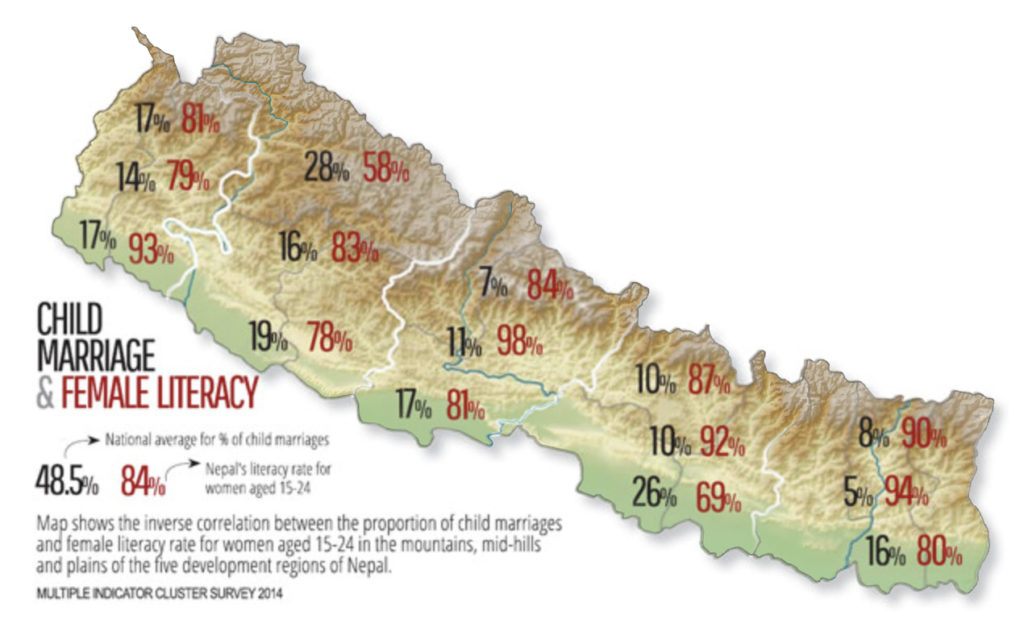ネパールではロックダウン期間に児童婚が増加
~女子生徒を学校にとどめておくキャンペーンは、今では自宅にとどめるようにする必要があります
出典:https://www.nepalitimes.com/latest/child-marriages-up-during-nepal-lockdown/
2020年5月21日Namrata Sharma

黒字が児童婚率、赤字が女性(15-24歳)の識字率
ネパールでは女子生徒の中退率が高いことから、女子生徒を学校にとどめるためのキャンペーンが行われていましたが、ロックダウンが3ヶ月目に入ったことで、今では女子生徒を家にとどめておくことが当面の課題になっています。
ネパールでは、児童婚や少女の人身売買の報告が増加していることから、女子生徒が学校の中退を防ぐことで女子の識字率を向上させようと取り組んできたが、ロックダウンが続けば頓挫するのではないかと懸念されています。
ネパールの全国的なロックダウンが発令されてから2週間後の4月8日、バルディア村に住む16歳の少女が自宅から姿を消しました。彼女は9年生の試験を終えたばかりでした。
彼女の両親は、娘が、近所に住む母方の叔父のところに滞在していたインド人の同級生と恋愛関係にあり、駆け落ちして国境をこっそり越えたことを知りました。両親は地元の警察に行方不明届を提出しましたが、「友達と一緒にいるのではないか」と届け出を無視されました。
両親はその後、グーラリアの地方警察署とマイティ・ネパール事務所に連絡をしましたが、警察はロックダウン対応で手一杯で、少女がインドから携帯電話で電話をかけてきたにもかかわらず、できることはあまりないと言いました。少女は、自分は大丈夫だと言い、両親に警察の捜査を取り下げてほしいと電話をかけてきました。
「彼女は、中退率が高く、虐待を受けやすい低所得者コミュニティを対象にした女子教育プログラムに参加していた600人のティーンエイジャーの一人でした」と、ルーム・トゥ・リードのサクンタラ・チャウダリ氏は言います。
ルーム・トゥ・リードがサポートをしていたグーラリアに住むもう一人の9年生の少女、隣村の少年と駆け落ちをしました。彼女の両親は、彼らのコミュニティでは駆け落ちは伝統の一部であると考えていたため、届け出を提出しないことにしました。
ロックダウンにより、大家族は経済的に困窮しており、少女を養うことは余分な口であり、彼女の駆け落ちに家族は安堵していました。少女はおそらく、今後、学業を続けることはないでしょう。
「ロックダウン中は食料が不足し、多くの家庭でお金が不足し、娘たちへの優先順位が低くなっています」と、ルーム・トゥ・リードの女子教育プログラムのサリナ・タマンさんは説明します。
バンケ、バルディア、タナフ、ヌワコットの各地区で、女子教育プログラムを通じて支援を行っている4,321人の少女のうち、500人の少女がロックダウン以降、連絡が取れなくなっています。これらは、すでに学校を退学するリスクが高いと判断された家庭で起きています。一方で、良いニュースは、少女たちの大半とは連絡が取れており、ラジオを通して家庭での学習を続けているということです。
ルーム・トゥ・リードは、ロックダウンが始まって以来、バルディア地区とバンケ地区だけで、支援している少女の間で少なくとも7件の児童婚の事例を確認しています。少女の多くは電話の接続が悪い地域にあるか、あるいは、自分の携帯電話を持っていないために、定期的に報告したり、潜在的な虐待の状況について相談できる環境にありませんでした。
バンクのコハルプールに住む16歳の少女は、ルーム・トゥ・リードからの電話に応答しなくなり、彼女がクラスの男の子と一緒に逃げ出したことが判明しました。彼女の母親は娘を取り戻そうとしましたが、ロックダウンのために移動することができませんでした。彼女は娘が自殺するかもしれないという心配があり、警察に事件を報告していません。
マララ基金は、危機が過ぎれば、世界でさらに1,000万人の女子中学生が学校に通えなくなる可能性があると推定しています。ロックダウンは世界中の教育に影響を与えていますが、ネパールのような国では、女性の識字率を向上させ、女子生徒の中退率を減らすために長年取り組んできた活動が水の泡になってしまう恐れがある。
ユネスコは、新型コロナウィルス感染症による学校閉鎖により、現在、世界の子どもたちの90%近くが学校に通っていないと推定しています。子どもたちの数は15億4,000万人にものぼり、うち少女の数は7億4,300万人近くになります。
ネパール西部に戻ると、バンケ地区とバルディア地区の14歳から17歳までの5人の少女が、ロックダウンが始まって以来、同級生や地元の男の子と結婚するために家出をしています。そのほとんどがロックダウン後の2つの地区での事例に過ぎませんが、少女たちがきちんと管理されていたために明るみに出たのです。新型コロナウィルス感染症による学校閉鎖の間に、児童婚と人身売買が増加する恐れがあります。
そのうちの一人であるコハルプールに住む17歳の少女は、母親から関係をもったことを叱責された後に結婚しました。また、バルディアに住むもう一人の16歳の少女は、ロックダウン期間中に自宅の叔母から強くあたられたあと、家出を決意しました。
警察は、ロックダウン中に起きている人身売買、児童婚、家庭内虐待について事件の登録には消極的です。伝統的に、社会における女性と少女の安全を優先しない状況が露呈しており、現在の危機はそれを拡大させています。
◆この困難な時期にも子ども達が継続して教育を受けられるよう、ご支援をお願いいたします。
寄付はこちらから:
https://give.roomtoread.org/Together2020
Child marriages up during Nepal lockdown
Campaign to keep girls in school may now need to refocus on keeping them at home
source: https://www.nepalitimes.com/latest/child-marriages-up-during-nepal-lockdown/
Namrata Sharma
May 21, 2020

Nepal’s high dropout rate for female students had prompted campaigns to keep girls in school. But as the country’s lockdown enters its third month, the challenge now seems to be to keep them at home.
With a rise in reports of child marriages and trafficking of girls, there are fears that Nepal’s efforts to increase female literacy by preventing them from dropping out of school may suffer a setback if the lockdown continues.
A 16-year old of a village in Bardia disappeared from her home on 8 April, two weeks after Nepal’s nationwide lockdown went into effect. She had just completed her Grade 9 exams.
Her parents found out she was having an affair with an Indian classmate who was staying in their neighbourhood with his maternal uncle, had eloped and sneaked over the border. The parents filed a missing person report at the local police, but they ignored the complaint saying she was probably staying with friends.
The parents then contacted the District Police Office and Maiti Nepal office in Gularia, but the police was overstretched enforcing the lockdown, and said there was not much they could do even though the girl called from an Indian mobile. She called to say she was fine and to ask her parents to drop the police investigation.
“She was one of the 600 teenagers who were part of our girl education program for low-income communities with high dropout rates in school and vulnerable to abuse,” says Sakuntala Chaudhari of the literacy advocacy group, Room to Read.
Another Grade 9 student from Gularia that Room To Read was monitoring eloped with a boy from the next village. Her parents decided not to file a case because their community considered elopement a part of its tradition.
It turned out that the extended family was in financial trouble because of the lockdown, the young woman was an extra mouth to feed and when she eloped it was a relief to the family. However, she will now probably not continue with her education.
“During the lockdown there are food shortages, money is running out for many families, and daughters have the least priority,” explains Salina Tamang of Room to Read’s Girls’ Education Program.
Out of the 4,321 girls the program supports in the districts of Banke, Bardia, Tanahu, and Nuwakot, with distance learning through radio, 500 girls have been out of touch during since the lockdown. These were from families which were already deemed to be at high-risk of dropping out of school. But the good news is that a majority of the girls are in contact and continuing home studies through radio.
Room to Read has identified at least seven cases of child marriage since the lockdown started among the students it supports in Bardia and Banke districts alone. Many of the girls are in areas with poor phone connection, or the girls did not have their own phones to report regularly or talk about potential abusive situations.
A 16-year-old from Kohalpur in Banke stopped responding to calls from Room To Read, and it turned out she had run away with a boy in her class. Her mother tried to get her back, but could not travel because of the lockdown. She has not reported the case to the police because of worries that her daughter might commit suicide.
The Malala Fund estimates that 10 million more secondary school girls worldwide could be out of school once the crisis has passed. The lockdown has affected education worldwide, but in countries like Nepal it threatens to undo years of work to improve female literacy and reduce the dropout rate among girl students.
UNESCO estimates that nearly 90% of the students enrolled in education globally are currently out of school because of COVID-19 closures. This represents 1.54 billion enrolled children and youth, including nearly 743 million girls.
Back in western Nepal, five other girls between the ages of 14-17 in Banke and Bardia districts have run away from home to get married since the lockdown began, mostly with classmates or local boys. These are just cases in two districts after the lockdown, and only came to light because the girls were being closely monitored. There is a fear child marriages and trafficking will increase during the COVID-19 school closure.
One of them, a 17-year-old from Kohalpur, got married after her mother scolded her for having an affair. Another 16-year-old in Bardia decided to run away from home after harsh behaviour by her aunt at home during the lockdown.
Police are reluctant to register trafficking, child marriage and domestic abuse cases during the lockdown, and this has exposed the traditional lack of priority given to the safety women and girls in society, which the present crisis has magnified.
To help children continue to access the stabilizing force of education during this turbulent time, click here to make a donation.
https://give.roomtoread.org/campaign/covid-19-urgent-appeal/c278379


